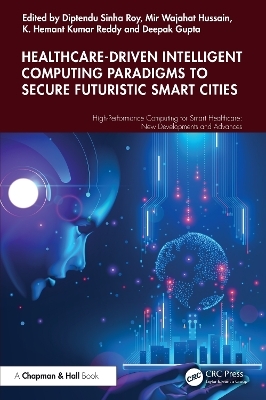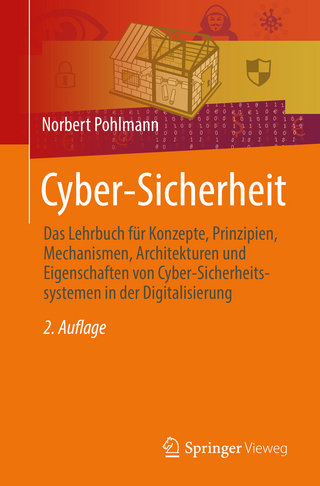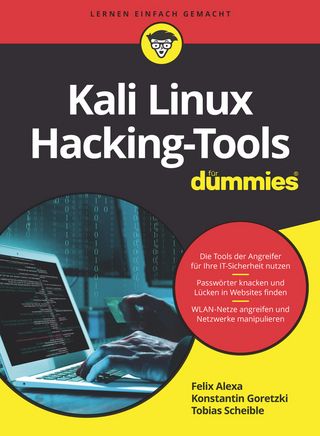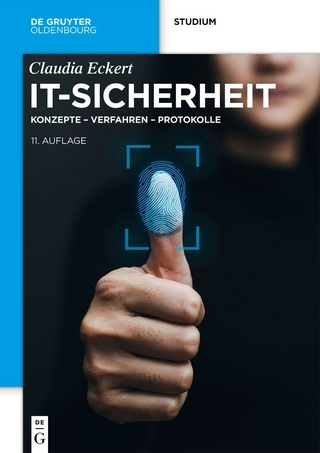
Healthcare-Driven Intelligent Computing Paradigms to Secure Futuristic Smart Cities
Chapman & Hall/CRC (Verlag)
978-1-032-62689-5 (ISBN)
- Noch nicht erschienen (ca. Dezember 2024)
- Versandkostenfrei innerhalb Deutschlands
- Auch auf Rechnung
- Verfügbarkeit in der Filiale vor Ort prüfen
- Artikel merken
Healthcare-Driven Intelligent Computing Paradigms to Secure Futuristic Smart Cities presents the applications of the healthcare sector in the context of futuristic smart cities. It explores various applications like the advancements in computational and network models along with the innovative paradigms for an able healthcare model. The book discusses the state-of-the-art intelligent network and computing paradigms and machine learning models for robust healthcare. This book is for academicians, researchers, and entrepreneurs working on healthcare-driven intelligent computing paradigms to secure futuristic smart cities. It includes several aspects of the challenges faced by a futuristic smart city in healthcare, includes challenges emanating from the immense data generated by the wearable sensors, data analysis, and security concerns owing to the patient-related data. It works as a pertinent resource on how cutting-edge technologies can be integrated to aptly provide solutions for the numerous challenges faced by the healthcare industry. Includes several use cases, practical challenges, and solutions for executing smart healthcare.
Features
Covers a multitude of computing paradigms viz; Cloud computing, Fog Computing, and Mist Computing.
Healthcare is discussed leveraging smart city, so it can potentially identify the gaps and present some newer use cases to handle future pandemics.
The network aspect is also covered with an inclusion of the next-generation paradigm which is Software Defined Networking (SDN).
Security and privacy issues are considered, which is crucial to handle security-related aspects
Machine Learning models are also discussed to provide any entrepreneur develop a business model involving cutting-edge technologies.
This book is for academicians, researchers, and entrepreneurs working on healthcare-driven intelligent computing paradigms to secure futuristic smart cities.
Diptendu Sinha Roy was born in Hooghly, India. He received his B.Tech. degree from Kalyani University, Kalyani, India, in 2003, and the M. Tech. and Ph.D. from the Birla Institute of Technology Mesra, Ranchi, India, in 2005 and 2010, respectively. He is currently with the National Institute of Technology Meghalaya, where he is the Head of the Department of Computer Science and Engineering. His current research interests include distributed, grid computing, cloud computing, fog computing, software reliability, and optimization in engineering. He also performs research on design and analysis of distributed infrastructure of power systems. Mir Wajahat Hussain was born in Jammu & Kashmir, India. He received his B.Tech. degree from University of Kashmir, India, in 2014, and his master’s degree and Ph.D. from the National Institute of Technology Arunachal Pradesh and National Institute of Technology Meghalaya, India in 2017 and 2021 respectively. He is currently with the Alliance University, India, as an Assistant Professor. His research interests include software-defined networks and big data. K. Hemant Kumar Reddy was born in Berhampur, India. He received the M. Tech. and Ph.D. degrees from Berhampur University, Bhanja Vihar, India, in 2008 and 2014, respectively. He is currently with the VIT-AP University, India, as an Associate Professor. He is also serving as an associate editor of Journal of Intelligent and Fuzzy Systems (JIFS). His research interests include distributed and grid computing, cloud computing, fog computing, and service-oriented architectures. Deepak Gupta was born in Delhi, India. He has completed B.Sc. Honors in Physics from Delhi University, Delhi, and M.Sc. in Physics from Kumaun University, Nainital. He obtained his doctorate in Physics from the National Institute of Technology Meghalaya. He also worked as a research associate at NIT Meghalaya, Shillong. He is currently working at Galgotias University, Greater Noida. His areas of interest includes molecular electronics and soft matter computation.
1. Healthcare and its Applications in a Smart City. 2. Role of Body-Transfer System in Active Assistive Living for Effective Healthcare. 3. An in depth analysis of machine learning and artificial intelligence advancements in healthcare for smart cities. 4. Comprehensive Survey of IoT, Machine Learning, and Reliability Engineering for Health Care Applications. 5. Artificial Intelligence based Solutions for Optimized Data Routing through Multi-hop Healthcare Sensor Networks. 6. AIoMT: An AI Based Network Selection Framework for Next-Generation enabled IoMT Network in Smart City. 7. Concurrent Clustering with Outlier Removal in Healthcare. 8. Cluster Weighting-A New Clustering Technique for Outlier Removal and Noise Overlap in Healthcare Diagnosis for Smart City. 9. Cluster Weighting-A New Clustering Technique for Outlier Removal and Noise Overlap in Healthcare Diagnosis for Smart City. 10. Pneumonia classification in Chest X-ray Images Using Fusion of Deep Features and LightGBM. 11. AI-Driven Prioritization and Detection of Covid-19 Cases in Smart Cities: An Integration of X-Ray Imaging and ResNet18 Machine Learning. 12. Depression detection in social media text using machine learning techniques. 13. Depression Symptoms Prediction on Online Social Networks Using Machine Learning Algorithms. 14. A Sorting Strip based Body worn Antenna for Assisting Breast Cancer Detection for a smart Healthcare environment. 15. Artificial Intelligence Prediction of the Risk of Ovarian Cancer at an Early Stage in Smart Cities. 16. Chatbot Enable Brain Cancer Prediction using Convolutional Neural Network for Smart Health Care. 17. Federated Learning for Heart Disease Detection in Smart Healthcare: A Survey. 18. Federated Learning for Heart Disease Detection Using a Grey Wolf Transfer Learning Model Based on Multi-Perceptron Neural Networks. 19. A novel Mist-Fog federated learning model for heart disease detection in smart healthcare. 20. Energy-efficient and Delay Tolerant Prediction of Heart Disease in IoT-enabled Mist Computing Platforms.
| Erscheint lt. Verlag | 18.12.2024 |
|---|---|
| Reihe/Serie | High-Performance Computing for Smart Healthcare |
| Zusatzinfo | 39 Tables, black and white; 106 Line drawings, black and white; 3 Halftones, black and white; 109 Illustrations, black and white |
| Sprache | englisch |
| Maße | 156 x 234 mm |
| Themenwelt | Geisteswissenschaften ► Sprach- / Literaturwissenschaft ► Sprachwissenschaft |
| Informatik ► Netzwerke ► Sicherheit / Firewall | |
| Informatik ► Theorie / Studium ► Künstliche Intelligenz / Robotik | |
| Recht / Steuern ► Privatrecht / Bürgerliches Recht ► IT-Recht | |
| Technik ► Bauwesen | |
| Technik ► Umwelttechnik / Biotechnologie | |
| ISBN-10 | 1-032-62689-5 / 1032626895 |
| ISBN-13 | 978-1-032-62689-5 / 9781032626895 |
| Zustand | Neuware |
| Haben Sie eine Frage zum Produkt? |
aus dem Bereich


